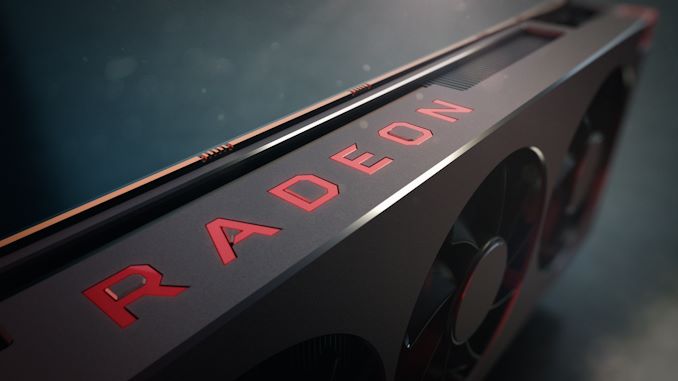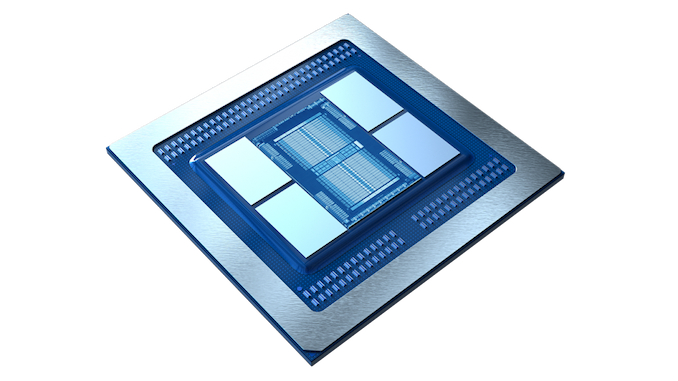The AMD Radeon VII Review: An Unexpected Shot At The High-End
by Nate Oh on February 7, 2019 9:00 AM ESTFinal Words
While there are definitely more areas to investigate, what we've seen of the Radeon VII is still the first 7nm gaming GPU, and that is no small feat. But beyond that, bringing it to consumers allows a mid-generation option for buyers; and the more enthusiast-grade choices, the merrier. The Radeon VII may be a dual-use prosumer/gaming product at heart, but it still has to measure up to being the fastest gaming card of the Radeon stack.
At the risk of being redundant, I can’t help but emphasize how surprised both Ryan and I are that this card is even here at this time. We’re still very early into the 7nm generation, and prior to last month, AMD seemed content to limit the Vega 20 GPU to their server-grade Radeon Instinct cards. Instead a confluence of factors has come into place to allow AMD to bring a chip that, by their own admission was originally built for servers, to the consumer market as a mid-generation kicker. There isn’t really a good precedent for the Radeon VII and its launch, and this makes things quite interesting from tech enthusiast point of view.
Kicking off our wrap-up then, let's talk about the performance numbers. Against its primary competition, the GeForce RTX 2080, the Radeon VII ends up 5-6% behind in our benchmark suite. Unfortunately the only games that it takes the lead are in Far Cry 5 and Battlefield 1, so the Radeon VII doesn't get to ‘trade blows’ as much as I'm sure AMD would have liked to see. Meanwhile, not unlike the RTX 2080 it competes with, AMD isn't looking to push the envelope on price-to-performance ratios here, so the Radeon VII isn't undercutting the pricing of the 2080 in any way. This is a perfectly reasonable choice for AMD to make given the state of the current market, but it does mean that when the card underperforms, there's no pricing advantage to help pick it back up.
Comparing the performance uplift over the original RX Vega 64 puts Radeon VII in a better light, if not a bit of a surprising one. By the numbers, the latest Radeon flagship is around 24% faster at 1440p and 32% faster at 4K than its predecessor. So despite an interesting core configuration that sees the Radeon VII ship with fewer CUs than the RX Vega 64, the Radeon VII pulls well ahead. Reference-to-reference, this might even be grounds for an upgrade rather than a side-grade.
All told, AMD came into this launch facing an uphill battle, both in terms of technology and product positioning. And the results for AMD are mixed. While it's extremely difficult to extract the benefits of 16GB of VRAM in today's games, I'm not ready to write it off as unimportant quite yet; video card VRAM capacities haven't changed much in the last two and a half years, and perhaps it's time it should. However at this moment, AMD's extra VRAM isn't going to do much for gamers.
Content creation, on the other hand, is a more interesting story. Unlike games there is no standard workload here, so I can only speak in extremely broad strokes. The Radeon VII is a fast card with 16GB of VRAM; it's a card that has no parallel in the market. So for prosumers or other professional vizualization users looking to work on the cheap, if you have a workload that really does need more than the 8 to 11 gigabytes of VRAM found in similarly priced cards, then the Radeon VII at least warrants a bit of research. At which point we get into the merits of professional support, AMD's pro drivers, and what AMD will undoubtedly present to pro users down the line in a Radeon Pro-grade Vega 20 card.
As for AMD's technology challenges, the upside for the company is that the Radeon VII is definitely Vega improved. The downside for AMD is that the Radeon VII is still Vega. I won't harp too much on ray tracing here, or other gaming matters, because I'm not sure there's anything meaningful to say that we haven't said in our GeForce reviews. But at a broad level, Vega 20 introduces plenty of small, neat additions to the Vega architecture, even if they aren't really for consumers.
The bigger concern here is that AMD's strategy for configuring their cards hasn't really changed versus the RX Vega 64: AMD is still chasing performance above all else. This makes a great deal of sense given AMD's position, but it also means that the Radeon VII doesn't really try to address some of its predecessor's shortcomings, particularly against the competition. The Radeon VII has its allures, but power efficiency isn’t one of them.
Overall then, the Radeon VII puts its best foot forward when it offers itself as a high-VRAM prosumer card for gaming content creators. And at its $699 price point, that's not a bad place to occupy. However for pure gamers, it's a little too difficult to suggest this card instead of NVIDIA's better performing GeForce RTX 2080.
So where does this leave AMD? Fortunately for the Radeon rebels, their situation is improved even if the overall competitive landscape hasn’t been significantly changed. It's not a win for AMD, but being able to compete with NVIDIA at this level means just that: AMD is still competitive. They can compete on performance, and thanks to Vega 20 they have a new slew of compute features to work with. It's going to win AMD business today, and it's going to help prepare AMD for tomorrow for the next phase that is Navi. It's still an uphill battle, but with Radeon VII and Vega 20, AMD is now one more step up that hill.












289 Comments
View All Comments
Oxford Guy - Thursday, February 7, 2019 - link
This card is a turkey for gamers. AMD fixed the noise level problem with Fury X and now we're getting less value than we did then. It's too loud."Also new to this card and something AMD will be keen to call out is their triple-fan cooler, replacing the warmly received blower on the Radeon RX Vega 64/56 cards."
Is the sarcasm really necessary? If you're going to mention the cooler thing why not point out just how far AMD has regressed in terms of noise. Remember Fury X, a card that is nice under load?
"Vega 20 has nothing on paper to push for its viability at consumer prices. And yet thanks to a fortunate confluence of factors, here we are."
Oh please:
Fiji: 596 mm2 for $650. Vega 10 495 mm2 for $500. Vega 20 331 mm2 for $700.
Anandtech says it's all so shocking that Vega 20 is available to consumers at all. Eyeroll. No. For $700, AMD could have put that extra die area to more use and given us 8 GB of VRAM. But that would involve doing the impossible and making a GPU that is attractive to gamers, not just peddling low-end Polaris rehashes indefinitely.
Consumers aren't getting the best value here. They're getting leftovers just as they did with Bulldozer/Piledriver — parts that were targeted at the server market first and not consumers. At least with Vega 20, though, there is some competitiveness, although this is mainly because Nvidia is artificially crippling the value of the GPU market with its inflated pricing strategy. That is what monopolies do, of course. Look at how long Intel was able to coast with Sandy-level performance.
"At 3.5 TLFLOPS of theoretical FP64 performance, the Radeon VII is in a league of its own for the price. There simply aren’t any other current-generation cards priced below $2000 that even attempt to address the matter."
That's marvelous for the people who are able to care about FP64, unlike gamers.
This is what happens when there isn't enough competition in a market. Gamers get the choice of two shafts: Turing and Vega.
Oxford Guy - Thursday, February 7, 2019 - link
Oh, yes... and the "console".At least the Switch is a real console. I'm not talking about that. I'm talking about awful low-end PCs being falsely called consoles, which has been the practice since Jaguar became an (unfortunate) thing.
Korguz - Friday, February 8, 2019 - link
like in a previous post of yours.. are you forgetting that the xbox and xbox 360 were also, " low end " pc's that your are claiming ?? the switch is a real console ?? ha.. the nintendo switch, is based off of the Tegra SoC's from nvidia... in a way.. " still " a low end PC......Oxford Guy - Friday, February 8, 2019 - link
The reason the Switch qualifies as a console is that it does something differently vis-à-vis the x86 gaming PC platform. It has a different form factor and related functionality. Artificial software walled gardens do not truly differentiate Sony and MS's low-end PCs from the PC gaming market. They are merely anti-consumer kludge that people have chosen to prop up with their cash.Merely having an x86 processor does not make something equivalent to an x86 PC. The Switch is clearly not the same thing as a low-end PC box like a Jaguar-based rubbish console. I am not particularly enamored with the Switch but at least Nintendo is offering something different to better justify its approach.
Korguz - Friday, February 8, 2019 - link
this sounds more like your own personal opinion and nothing more.. for some reason you hate the current consoles, and seems like there is NO reason for your hate...nintendo has offered something different for a console since the 1st Wii, and honestly, look where it has gotten them... the xbox and playstation platforms outsold the nintendo systems, up to the switch, which has out sold the other 2.. but the games them selves on the nintendo systems.. are lacking..
Oxford Guy - Friday, February 8, 2019 - link
"this sounds more like your own personal opinion and nothing more.. for some reason you hate the current consoles, and seems like there is NO reason for your hate..."Ad hominem isn't a rebuttal.
Korguz - Friday, February 8, 2019 - link
still just sounds like your personal opinion, regardlessHorzaG - Sunday, February 10, 2019 - link
Pointing out that (according to the poster) you're just expressing your opinion and "hate" without reasoning isn't an Ad hominem, you used the term incorrectly earlier in this thread also. Pretty embarrassing to be simultaneously so conceited and so wrong."You should never listen to a word Oxford Guy has to say because he's a frothing fanboy whose posts reek of desperation and are probably indicative of an inability to get laid"
That's an Ad hominem.
Korguz - Tuesday, February 12, 2019 - link
and saying this :" You should never listen to a word Oxford Guy has to say because he's a frothing fanboy whose posts reek of desperation and are probably indicative of an inability to get laid "
about someone.. doesnt prove your point any better...
Oxford Guy - Wednesday, February 13, 2019 - link
"Pretty embarrassing to be simultaneously so conceited and so wrong."It must be.